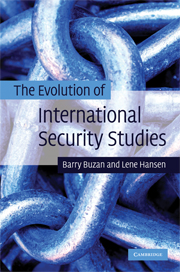Book contents
- Frontmatter
- Contents
- Foreword
- List of abbreviations
- List of figures
- List of tables
- Introduction
- 1 Defining International Security Studies
- 2 The key questions in International Security Studies: the state, politics and epistemology
- 3 The driving forces behind the evolution of International Security Studies
- 4 Strategic Studies, deterrence and the Cold War
- 5 The Cold War challenge to national security
- 6 International Security Studies post-Cold War: the traditionalists
- 7 Widening and deepening security
- 8 Responding to 9/11: a return to national security?
- 9 Conclusions
- References
- Author Index
- Subject Index
4 - Strategic Studies, deterrence and the Cold War
Published online by Cambridge University Press: 05 June 2012
- Frontmatter
- Contents
- Foreword
- List of abbreviations
- List of figures
- List of tables
- Introduction
- 1 Defining International Security Studies
- 2 The key questions in International Security Studies: the state, politics and epistemology
- 3 The driving forces behind the evolution of International Security Studies
- 4 Strategic Studies, deterrence and the Cold War
- 5 The Cold War challenge to national security
- 6 International Security Studies post-Cold War: the traditionalists
- 7 Widening and deepening security
- 8 Responding to 9/11: a return to national security?
- 9 Conclusions
- References
- Author Index
- Subject Index
Summary
This chapter focuses on the Cold War and the military, political, technological and strategic aspects of the superpower rivalry as theorised by the Strategic Studies core of ISS. The central theme of that story is how nuclear weapons influenced, and were influenced by, the rivalry between the US and the Soviet Union.
The distinct field of study we are calling ISS did not crystallise out until the mid-to-late 1940s, and neither the field nor the concept of security were fully formed and accepted from day one. What emerged in the US, and to a lesser extent Europe, during the 1940s and 1950s was a category of work at the intersection of military expertise and university based social science, aimed at addressing the policy problems arising from nuclear weapons and the broad-spectrum challenge posed to the West by the Soviet Union. These problems were seen as urgent. Because of their crucial contributions during the Second World War, civilian experts, mainly physicists and social scientists, could now specialise in military issues under the heading of security, which unlike ‘war’ or ‘defence’ nicely bridged the military and non-military aspects of the subject. As well as having relevant technical expertise not possessed by the military, a large and influential civilian cohort helped to address specifically American concerns about the dangers of society becoming militarised by a long-term struggle (Lasswell, 1941, 1950; Huntington, 1957; Deudney, 1995, 2007: 161 ff.).
- Type
- Chapter
- Information
- The Evolution of International Security Studies , pp. 66 - 100Publisher: Cambridge University PressPrint publication year: 2009
- 1
- Cited by



